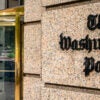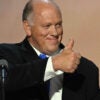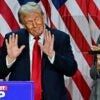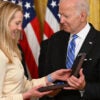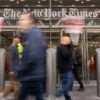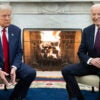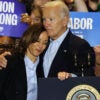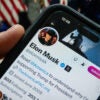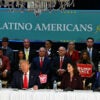Views that part from far-left progressivism apparently aren’t tolerated any longer by many colleges and universities. William Jacobson, founder and publisher of Legal Insurrection and professor of law, joins The Daily Signal Podcast to explain why he is being publicly shamed for writing the truth about the Black Lives Matter coalition.
Want to support The Daily Signal and get better access to our videos? Subscribe to our YouTube channel! Just click here: https://www.youtube.com/dailysignal
Jacobson, who also directs the Securities Law Clinic at Cornell Law School, wrote a blog post in June explaining the tainted history of the Black Lives Matter movement, as well as another post about “anti-American, anti-capitalist activists” who started the movement. For this, Jacobson received a public rebuke from the dean of the law school and faces a student-led effort to boycott his class.
We also cover these stories:
- Dr. Anthony Fauci delivers a stern warning that America needs to change its approach to COVID-19.
- The Supreme Court issues a 5-4 win for families on school choice.
- The European Union won’t allow visitors from America this summer.
“The Daily Signal Podcast” is available on Ricochet, Apple Podcasts, Pippa, Google Play, and Stitcher. All of our podcasts can be found at DailySignal.com/podcasts. If you like what you hear, please leave a review. You can also leave us a message at 202-608-6205 or write us at [email protected]. Enjoy the show!
Virginia Allen: I am joined by William Jacobson, a Cornell law professor and the founder and publisher of Legal Insurrection. Professor Jacobson, thank you so much for being here.
William Jacobson: Thank you for having me.
Allen: You wrote a couple of blog posts explaining the history of the Black Lives Matter organization. The posts address issues that you see with the organization and with its founders, and for this, students at Cornell and even faculty are trying to get students to boycott your classes. What did you write in your posts that is now appearing to be so offensive to these students and faculty?
Jacobson: Well, I’ve been at Cornell now for 12 years, and for most of that time, it was a fairly open environment. While it was certainly very liberal and I was the lone conservative on the faculty, [it was] nothing like I’ve experienced now.
So one of the things that I followed at the website over the years was the formation of the Black Lives Matter movement, particularly the Ferguson riots and the Michael Brown shooting.
Recently I was watching some of the protests and the riots and the looting, and one of the things I saw is people marching around with their hands raised in the air saying, “Don’t shoot.” And I recognize that right away is one of the foundational slogans of the Black Lives Matter movement, arising from the Michael Brown case.
Michael Brown was shot by a policeman in Ferguson, Missouri, and I think it was either 2014 or 2013. The narrative was created that he was shot with his hands in the air saying, “Don’t shoot.” The Black Lives Matter seized on that to gain national attention around the country.
I knew that to be false because the Justice Department under [former President Barack] Obama had investigated it and found out that never happened, that Michael Brown was not the victim of police brutality. He was a perpetrator who punched a policeman in the face and tried to steal his weapon, was shot once, made a second run at the policeman, was shot again, and that’s what killed him.
I recognized recently that this whole narrative of vicious police shooting a black man with his hands raised was false and I wrote about that, and it’s not the first time I’ve written about it. I’ve written about it multiple times since 2014. So that’s post No. 1 that set people off.
The complaint about that post is nobody contested the facts that I presented or the Justice Department findings. They said it was very insensitive of me at this time of turmoil to be writing about that.
The second thing that set people off was I wrote a post harshly critical of the looting and the rioting, and I talked about how this was a reflection of the Marxist foundations of the Black Lives Matter movement, which is true.
It’s well-documented that the original founders—in fact, there’s a video circulating now—bragged about how they had a Marxist agenda and were trained Marxist activists in their mindset. Their agenda has been to tear down the country, has been not to build up the country and it’s not then to heal racial relations, it’s been to exploit racial tensions, and so I wrote about that.
I also called on the federal government to get involved and to identify and prosecute the people who helped coordinate the violence, and I used that term specifically, helped coordinate the violence. So that was post No. 2.
Those two set people off for a variety of reasons. Why now? Why not some other time in the past? So what it initially started with was [an] alumni letter-writing and petition campaign to get me fired. Then a faculty letter signed by 21 of my colleagues denouncing me, then a statement from the dean denouncing me, and then multiple student groups announcing a boycott of my course. And that’s where we are today and I can get into more detail if you want.
Allen: So, essentially, what you’re saying is you’re being publicly shamed, your classes are being boycotted, not because you made unfactual statements, but because the timing was insensitive.
Jacobson: Well, in part. … They’ve never contested the facts of what I said. They’ve said I too broadly painted a negative brush of the movement, that while maybe the founders were Marxists, maybe some of the other people, I shouldn’t have cast aspersions on these peaceful protesters.
But I think anybody fairly reading what I wrote doesn’t cast aspersions on people who were peacefully protesting. It definitely cast aspersions on people breaking store windows, looting stores, beating people up, tearing down statues, and all of the other things. So … I would call it a hypersensitivity to a dissenting voice on campus.
Allen: I think one of the things that really appears to be happening is that we’re seeing a blurring of the lines between the statement “Black lives matter” and the organization Black Lives Matter. Can you just speak to that difference between just that statement saying Black Lives Matter and then the organization?
Jacobson: You’re right. There are two different aspects and it actually was a fairly brilliant move by the organizers several years ago to essentially establish a hashtag, a Twitter hashtag, a social media hashtag called Black Lives Matter, but also to establish their own organization, and the line does blur.
So if you ask people, “Do you think black lives matter?” The answer is going to be for 99% of the population, including me, “Yes, of course.” But that is exploited, those feelings of goodwill are exploited by a movement, which does not have goodwill in its heart, the organized movement by people who have used this as a manipulative device.
So it’s very interesting how they have developed a feelgood hashtag, but behind it is a fairly organized structure, and there are multiple structures that tend to exploit things.
Allen: Cornell’s Black Law Students Association responded to your blog posts by making a number of false accusations about you. In response to that, you offered to sit down and have a debate with them, with a person of their choosing. And to this offer, they responded in an email to the Cornell law community saying, “Faculty members who challenge students to debate them on the motives of those fighting to preserve black life are clearly more interested in amplifying their own agendas than engaging in thoughtful and reflective discourse.”
I find their response really interesting because you were actually asking them to have just that, a thoughtful and reflective discourse, and they said no. What does this response tell you about the motives of students who are actively opposing you?
Jacobson: What happened is, when I went public with this on my website, among the things I said is that I would be happy to have a public debate at the law school in the fall when classes resume with a representative of Black Law Students Association and a faculty member of their choosing.
So it wouldn’t be me against a student, which might have some perception of unfairness, it would be me essentially against two people, and we could talk this through. We could talk it out. I asked the law school to sponsor it. I asked it to be livestreamed and we could talk through these issues.
So actually what I proposed was a debate, an open debate, a fair debate, and where people could air the issues. But it’s very clear to me that neither they nor the other student groups nor the administration have any interest in that because there is a uniformity of acceptable viewpoint on campus. It was announced by the dean in a letter condemning me for my writings.
It has been announced, not with regard to me, but more generally by the Cornell University administration that you are on board with the agenda of the Black Lives Matter movement or you have no place, and that is really the problem here, is that they do not want a debate about the issues.
I would love to debate why I believe the movement is extremely destructive, that it is the opposite of everything we have been taught about racial healing, about valuing the worth of each person based on their character and their merits, not their skin color, that this obsession with seeing everything that happens in the world through a racial lens is the opposite of what is in everyone’s best interest.
So I would love to have that debate, not just on the history of the Black Lives Matter organized movement, but the bigger issue. But that’s not a debate to them, and I’m going to say them, I mean the community, the organized community, including administrators, faculty, and most student groups …
That’s not up for debate and it should be because I believe when we look back on this moment in history, whether it’s six months from now, six years or 60 years from now, we are going to realize how much damage this movement, this racialized movement did to the country, that it did nothing to advance the cause of racial justice. It just served to tear the nation apart. I’d love to have that debate, but that’s not a debate they want to have.
Allen: Are there students that are coming to you and saying, “Actually, professor Jacobson, I agree with you”? Or maybe even who are saying, “I don’t agree, but I still respect your choice to speak out and say these things and write these things”?
Jacobson: Yeah. What I have received is really an outpouring of support from students. Many students have written to me assuring me that I have a lot of support at the law school among students, but that it’s very quiet support, that people are afraid to speak up. And I’ve received that message many different ways. So that’s one of the real tragedies of this.
One thing I’ve learned, this is not primarily about me—I mean, I have job security, I have academic freedom as part of my job, the threat to my job is I’m not going to say it’s nonexistent, but it’s not the most substantial thing.
What me being targeted has done is it has intimidated students. It has sent a message to students that on this issue, there can be no dissent, and if you do dissent, you run the risk of being treated the way professor Jacobson is being treated. That’s the opposite of what should be happening at the law school.
The boycott of my classes has also put students in a difficult position because there are many students who want to take my course. My course has nothing to do with politics. It has nothing to do with race. It’s regarding investment disputes and how to handle investment disputes. It’s a small class, but we typically will get three to five, four to five people applying for each available spot. So there’s a strong interest in the course.
But now that a dozen or so student groups have announced not just that they are boycotting the course, but that they’re calling on others to do so, it puts students in a very difficult position because now taking my course could be deemed a political act, that it would be deemed an act against the Black Lives Matter movement if they were to pursue the education they desire, which is a completely nonpolitical education.
So I think you add it all up, you add up the quiet student support, the fear of speaking up, the political litmus test for taking a course, and I think it has been extraordinarily destructive to the atmosphere at the law school and that’s what students have conveyed to me.
Allen: Wow, wow. I think that’s the perfect word to describe it, destructive.
I feel like at the end of the day, that, for me, is what is so frustrating as a recent college grad—I only graduated about four years ago—is, I think of university as being a place of mixed ideas. People are allowed to have their own opinions and you go there to be presented with different views and to kind of wrestle with thoughts and ideas and have those challenging conversations. But now it’s almost like that whole notion is sort of being like flushed down the toilet.
Where has that gone, that idea that it’s OK for us to have differing perspectives and we can actually engage in a civil debate?
Jacobson: There’s a lot of verbiage given toward that idea at the Cornell campus. If you read the statements by the president of the university, it’s very flowery language about open environment and opening course and exchange of ideas, and I think you see the same thing at the law school.
But when it comes to the actual test, when it comes to the real-life scenario of the most hot-button issue facing the country right now, they don’t apply that to that issue.
Yes, I could probably rattle off a dozen or two dozen issues where you can have a debate, but on the single most important one, you can’t. So I think that that’s another example of how destructive it has become.
This is not something that I’ve seen at Cornell previously, if anybody’s ever heard me speak before and they’re all recorded, I constantly say that Cornell, relative to a lot of other schools, certainly relative to a lot of other Ivy League schools, is a relatively moderate place.
I always would point out how there have been repeated attempts over the years to get me fired, to harass me, to threaten people about me, but it’s always comes from off-campus, never inside the campus.
This is first time it’s come inside the campus. This is the first time I’ve seen such a complete shutdown on any dissent with regard to an important issue. So I think that, in many regards, Cornell does permit open inquiry, but not on this one.
Allen: … You being one of the only conservative professors, openly conservative on the campus, have any of your liberal colleagues been scrutinized for statements that they’ve made in the past?
Jacobson: No. That’s, of course, the complete double standard here. The denunciation of me by the dean of the law school, as the dean on behalf of the institution, which is extraordinary, I’m not sure if it’s ever been done in the history of Cornell Law School.
We have on campus and at the law school some faculty who say things that I consider highly offensive. We have a faculty member who I happen to like a lot who was a supporter of Occupy Wall Street.
Nobody gets that scrutiny. Nobody who approaches things from left of center and nobody who approaches things from far left of center gets the type of scrutiny and the type of administrative reaction that I have received, which I think tells you something that when push came to shove, all of this dialogue about maintaining a neutral forum for the debate of ideas went right out the window, that it came right down to politics and pressure.
I have to assume that the dean was receiving pressure from a lot of people because the statement that he issued should have been one sentence, maybe two sentences, which is, “While I may personally disagree with professor Jacobson, he has the academic freedom to express his own views and we will not take any disciplinary action, period,” instead of spending multiple paragraphs lashing out at me and announcing that my writings are contrary to the values of the school, something that was announced without giving me any chance to be heard on it, any chance to contest that. It was simply announced as a proclamation.
So I think that it has been the sort of thing where there’s a complete double standard that they defend the right of people on the far left to make statements and they never engaged in that sort of critiquing in public shaming that I’ve been put through.
Allen: Are you concerned that you might be fired?
Jacobson: I mean, they’ve announced they’re not, OK? So if they do, we’ll see. That’s not my primary concern right now. I think if I were in a different position that perhaps, I mean, I don’t have tenure but I have something that’s kind of the equivalent of tenure and so I do have job protection and they’ve announced they’re going to honor that.
Things could change. I certainly can’t say I won’t be fired to an absolute certainty, but they have announced that that’s not going to happen, but we’ll see. But that’s not my primary concern.
My primary concern is that there was an attempt made to damage my reputation. There [were] very destructive actions taken with regard to student course choices and to the open intellectual environment at the law school, and those will be much more lasting. Long after I’m gone, I think there will be ramifications from the targeting of me that has taken place.
Allen: From the time that you started teaching at Cornell to now, do you remember a shift … of when things started to change and we entered into this much more politically correct space where freedom of speech felt much more limited?
Jacobson: Well, with regard to what’s going on now, I think it’s a mistake to put it through the lens of political correctness. Political correctness is what we’ve seen on campuses forever, or at least for decades. This is way beyond political correctness. This is a function of what I would call campus cancel culture that has been growing over the years.
I can’t put a year on it, but I think that in the last three to five years, there has been a growing intolerance on campuses. We see that around the country, a lot of speakers being shut down, driven off of campus, students being harassed because they express a non-liberal, non-leftist point of view. So it’s been building, but at Cornell, I haven’t seen it building in a very bad way. It’s my experience.
Something changed the last couple of months. I mean, this is, to me, a unique moment in time where you have a confluence of factors, which are coming together to create an extraordinarily hostile environment for open inquiry when it comes to the Black Lives Matter movement, the organized movement and an agenda.
So I think it would be a mistake to compare this to a lot of the other things that have happened, although the other things did create an atmosphere where intolerance was allowed to foster.
Allen: So how do you plan to proceed? Are you going to keep writing and sharing your conservative view?
Jacobson: Yes, and I’m going to go on anyone’s podcast who would take me, any TV show that will take me, any radio show. I’m going to continue writing.
I think that for me to shrink away from this challenge would be a huge mistake. It’s something I would personally regret forever and I think it would be a mistake for the students because I’ve not only received many student emails, I’ve received emails in the hundreds, the multiple hundreds around the country, because I did have some major media appearances, of people who are thankful that there is somebody who is able to speak out because most people are afraid of losing their job, with good reason.
We’ve seen that across the country that anyone who makes the slightest negative statement about the Black Lives Matter movement, anyone who questions rioting and looting is subject to possibly losing their job.
So I think this is a moment in time where we need more people to be able to stand up, but I recognize most people can’t. I mean, I can’t expect a law student, 24, 25 years old, just about to embark on their career. They know how devastating it would be if there were the sort of things said about them that are being said about me.
I mean, it would damage their career prospects. It would damage their job prospects to have that stuff on Google searches. So I understand why they can’t, why they can only speak to me quietly and send me private messages.
So I do feel a bit of an obligation to continue to speak out for them because there’s nobody else to do it at this point in time, certainly not at Cornell Law School.
Allen: Yeah. Well, thank you for continuing to speak out. If you would just tell our listeners a little bit about Legal Insurrection, what they can find there, why they should follow it and read what you write.
Jacobson: Yes, Legal Insurrection, I started the website in October 2008, which is after I was hired at Cornell. So I don’t think they would have hired me if I had the website at the time. In fact, I’m quite certain they would not have.
But it started off as a solo blog by me for a couple of years on Google Blogger and it’s developed into a bigger thing over time and now we have a staff of people. We have writers, we have researchers and investigators. We are also a 501(c)(3) at this point. So we try to grab onto issues, investigate them, write about them, push them out into the media.
For whatever the reason, I think maybe because of my position in my real job, which is at Cornell Law School, I seem to be a lightning rod for certain controversies.
I’ve had controversies where I went to colleges to talk about free speech and to talk about why even hate speech or what we call hate speech is constitutionally protected and that upsets people … . So we try to grab onto issues related to free speech, campus free speech, free expression, capitalism, those sort of things, and push them out there, and for whatever the reason, we get some pushback sometimes.
Allen: Yeah. Well, we are certainly thankful for the work that you’re doing. Professor Jacobson, thank you so much for coming on the show today.
Jacobson: Great. Thank you for having me.
This transcript has been corrected to reflect that Jacobson said aspersions.


